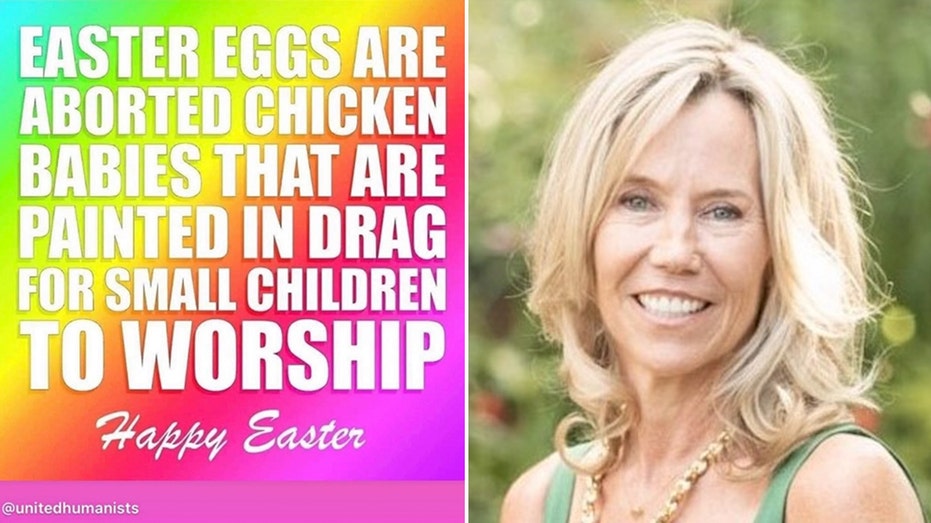A local New Jersey Democrat is facing calls to resign from her post after she shared a meme on social media mocking Easter with references to drag and abortion.
“Easter eggs are aborted chicken babies that are painted in drag for small children to worship,” said the meme shared by Glen Rock Borough Councilwoman Paula Gilligan on Instagram last week.
Gilligan faced immediate backlash from members of the community, especially Christians, who demanded she apologize and step down from Glen Rock’s all-Democrat, all-female council. Some are even planning to protest her actions at the borough’s next council meeting on Wednesday night.
VIRGINIA COUNTY DECLARES TRANSGENDER DAY OF VISIBILITY ON EASTER THIS YEAR
Gilligan later apologized in a statement released on social media and on the council’s website, claiming her posting of the meme was intended to express her views on abortion and trans issues, but notably made no mention of Easter.
“It has come to my attention that there are constituents in Glen Rock that have concerns with a meme on my personal Instagram story. The meme takes aim at the absurdity of ‘personhood’ laws,” Gilligan wrote, referencing various current and proposed laws in states around the country dictating that fetuses have the same legal rights as a person already born.
“It is my personal opinion that people have the right to control their bodies and their lives. My personal Instagram does not constitute the official views, opinions or beliefs of the Mayor and Council of the Borough of Glen Rock. To those who feel it mocks your holiday traditions, that was not my intention. Wishing all who celebrate a peaceful, joyous holiday,” she added.
Gilligan’s posting of the meme and subsequent apology came just weeks after residents of Glen Rock gathered at the local high school cafeteria on Mar. 9 to stand in solidarity against antisemitism following multiple instances of vandalism around the borough that even attracted the attention of Democrat Rep. Josh Gottheimer, who condemned them.
Glen Rock’s mayor and other council members released a statement over the weekend apologizing to members of the community offended by Gilligan’s actions.
WATCH: DEMOCRAT FRONTRUNNER IN TIGHT SENATE RACE DROPS RACIAL SLUR DURING HOUSE HEARING
“We have been made aware of a post that appeared on one of our Council Member’s personal Instagram stories. This post invoked Easter, the holiest day of the year in the Christian calendar, in a point about two issues that have nothing to do with Easter,” the statement said.
“We all feel very strongly that everyone’s religious beliefs and traditions must be treated with respect. They should not be the subject of jokes or inflammatory social media posts. That is even more true when the social media post is made by an elected official, because we are here to represent and support all Glen Rockers of all religious beliefs and backgrounds,” it said.
“We understand how important Easter and the symbols of Easter are to the many Glen Rockers who celebrate,” it added.
Gilligan has so far not said whether she is considering resigning and did not immediately respond to Fox News Digital’s request for comment. Fox has also reached out to Gottheimer’s office for comment considering his recent strong stance against antisemitism.
Speaking with Fox News Digital ahead of Wednesday’s council meeting, local Republican leader Barry Wilkes described his reaction to Gilligan’s mocking of Easter, and expressed hope that members of the community will show up en masse at the meeting to speak out against such rhetoric.
“I’m a churchgoer, and I’m a believer. To see this the week before Easter was really troubling — troubling to the respect that it has absolutely nothing to do with what the holiday, what the holy day means. The resurrection of Christ has absolutely nothing to do with that,” Wilkes said.
“What bothers me most, and the reason I’m involved, is because it’s very selfish when adults do these types of things because it only hurts our children. It confuses our children and makes it harder for them to figure out what’s going on, what the world is all about,” he said.
Wilkes, a former candidate for the New Jersey state Assembly who is considering his own run for district chair, said he was part of a group looking into launching a recall effort against Gilligan, and that he wanted people to show up in the hundreds for the 6:30 p.m. ET council meeting and the 8:00 p.m. ET question portion to show what kind of behavior shouldn’t be displayed by a local elected official.
“You want someone on a council who people look up to, who has answers for them, who you believe in because you voted for them and trusted them. To come out two weeks after the March 9th meeting and be divisive with something like this is just blatant hypocrisy,” he said.
“I think betrayed is a good word,” he added.







